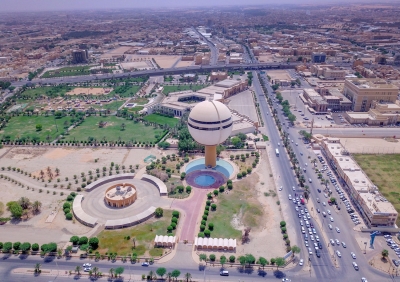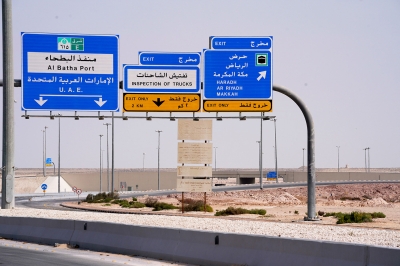

Logistic Services in the Kingdom of Saudi Arabia refer to the management and organization of the movement of goods or services in the Kingdom, including land, sea, air transport, and electronic means of transport of goods or services. Developing the logistics sector is one of the key goals of the second pillar of Saudi Vision 2030, focusing on a thriving economy, with the ambition of positioning the Kingdom as a global logistics hub. Additionally, the logistics sector is a fundamental part of the National Industrial Development and Logistics Program (NIDLP) and serves as a promising pillar for economic and developmental diversification in the Kingdom.
Logistic services sector enablers in Saudi Arabia
The logistic services sector in the Kingdom benefits from several competitive advantages. These include its strategic location at the intersection of three continents: Asia, Africa, and Europe, and its position on major global trade routes within the Red Sea basin. Additionally, the Kingdom's economy stands as the largest market in the Gulf Cooperation Council (GCC) and a key consumer market in the Middle East and North Africa (MENA) region. Its geographical location further qualifies it as a primary hub for connecting global trade and shipping routes, making it a central logistics center for serving regional markets.
NIDLP, launched in 2019, is geared toward transforming the Kingdom into a global logistic services platform. It focuses on enhancing the efficiency, quality, and speed of logistic services, improving infrastructure, increasing capacity, and reducing shipping costs by connecting local networks and establishing regional networks. The program also aims to streamline customs clearance, facilitate the movement of goods across borders, improve distribution within the country, offer competitive delivery costs, and strengthen governance, regulations, and private sector participation in the logistic services sector.
Growth of the logistic services sector in Saudi Arabia
The logistic services sector ranked among the top ten promising sectors for growth in the second quarter of 2024. During this period, there were 11,928 active commercial registrations, reflecting a 76 percent growth compared to the same period in 2023, which witnessed 6,742 commercial registrations.
Riyadh Province ranked first in the Kingdom in terms of growth in existing logistics records, with a total of 5,802 records, accounting for 49 percent. Makkah al-Mukarramah followed in second place with 3,170 records, representing 27 percent. The Eastern Province secured third place with 1,465 records, comprising 12 percent. Qassim came in fourth with 347 records, representing 3 percent, while al-Madinah al-Munawwarah ranked fifth with 323 records, accounting for 2.7 percent.
In 2023, the Kingdom advanced seventeen positions globally in the Logistics Performance Index issued by the World Bank, climbing to the thirty-eighth rank among 160 countries. This improvement came after significant leaps in several key sub-indicators, including logistic efficiency, tracking and tracing, timeliness, customs, infrastructure, and maritime shipping.
National Transport and Logistic Services Strategy in the logistic services sector
The National Transport and Logistics Strategy, launched as a key pillar of Saudi Vision 2030, aims to achieve several goals within the logistic services sector, as follows:
- Enhancing integration with various modes of transport in the Kingdom by improving connections between maritime, air, road, and rail transportation to optimize operations.
- Incorporating smart technologies, such as automation across ports and logistic infrastructure.
- Advancing the Kingdom's ranking in the Logistics Performance Index from fifty-fifth place to the top ten, ensuring regional leadership.
- Supporting the objective of having three Saudi cities ranked among the top one hundred cities worldwide.
- Positioning the Kingdom as a global hub for major international projects aimed at boosting trade between East and West.
- Reinforcing the Kingdom’s global standing through reforms and initiatives in the logistic services sector.
- Increasing regional connectivity, making the Saudi market more attractive to individual investors, and facilitating the movement of goods and people.
- Streamlining logistics service licensing procedures and legislation.
- Providing advanced logistic services at lower costs for the transportation and storage of goods made in the Kingdom, encouraging local industrial initiatives, and attracting new industrial investors.
- Establishing global logistic platforms for maritime navigation with two major global aviation hubs.
- Developing sixty-nine logistic platforms, consolidated into twenty-seven logistic zones, eight areas at land borders, nine truck parking zones, and three logistic areas at the airports of Riyadh, Jeddah, and Dammam Cities, designed to handle four-five million t of air cargo annually. Additionally, three logistic areas in the ports of Jeddah, King Abdullah, and King Abdulaziz will handle fourteen million containers, playing a crucial role in enabling exports, imports, and re-exports.
Master plan for logistic centers
On August 27, 2023, Crown Prince, Prime Minister, and Chairman of the Supreme Committee for Transport and Logistics, His Royal Highness Prince Mohammed Bin Salman launched the master plan for logistic centers. This initiative aims to enhance logistic infrastructure, diversify the local economy, and strengthen the Kingdom's position as a leading global investment hub and logistic center.
The master plan of the logistic hubs includes fifty-nine centers spread over an area exceeding one hundred million m², including twelve logistic hubs in Riyadh Province, twelve in Makkah al-Mukarramah Province, seventeen in the Eastern Province, and eighteen in the rest of the Kingdom's provinces.
Logistic centers in Saudi Arabia
There are twenty-one operational logistic centers in the Kingdom, categorized into several types:
- Airfreight hubs: These are multimodal centers focused on ground-side operations for general air freight, terminal operators, and postal service providers.
- Dry ports: Inland logistic hubs, serving as dry rail ports for handling and distributing goods.
- International distribution centers: These centers handle transportation, storage, and distribution activities for re-exportation globally.
- Industrial cities: Service hubs supporting economic and industrial activities.
- Domestic distribution centers: Logistic hubs dedicated to the transport, storage, and distribution of goods for national, regional, and semi-urban centers.
- Land border crossings: Facilities for short-term distribution, shipping, and storage, located near land borders.
- Port logistic centers: Hubs focused on assembly, sorting, and other logistic operations at ports.
Related quizzes

